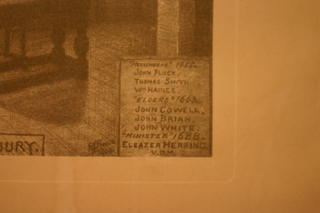Justin Taylor recently posted this famous quote from Martin Luther:
"If I profess with the loudest voice and clearest exposition every portion of the Word of God except precisely that little point which the world and the devil are at that moment attacking, I am not confessing Christ, however boldly I may be professing Him. Where the battle rages there the loyalty of the soldier is proved; and to be steady on all the battle front besides, is mere flight and disgrace if he flinches at that point." (Luther's Works. Weimar Edition. Briefwechsel [Correspondence], vol. 3, pp. 81f.)
These words should spur us to think on where the battle is raging in our day, and here are my thoughts on where the fire is hottest (1) in the academy, (2) in the church in the USA, and (3) on the street:
In the Academy:
1. Open Theism: the view that the future choices of free creatures do not exist to be known, therefore not even God knows them. Thankfully the Baptist Faith and Message 2000 added a line to its statement on God to address this issue: "God is all powerful and all knowing; and His perfect knowledge extends to all things, past, present, and future, including the future decisions of His free creatures."
2. Inclusivism: the view that people can be saved apart from conscious faith in Jesus Christ. I am in the process of reading Terrance Tiessen’s Who Can Be Saved? Reassessing Salvation in Christ and World Religions. Tiessen is arguing for "accessibilism," which holds that "God does save some of the unevangelized." I will eventually post a review of this book.
3. Justification: The New Perspective on Paul has called for a re-evaluation of the Protestant understanding of Justification by Faith, but the best explanation of all the evidence remains the one provided by the reformers. Justin Taylor links to a series of articles on the topic in a new online magazine called Reformation 21 here.
4. Egalitarianism: A vocal minority argues that the gender roles the Bible gives for the home and the church should be set aside. I think that Bible believing people are going to keep right on reading their Bibles and seeking to live out the gender roles outlined in passages such as Ephesians 5:21-33 and 1 Timothy 2:8-15. You can read my attempt to put these things together in a paper presented at this year’s Wheaton Theology Conference here.
Those of us in the academy must contend earnestly for the faith once for all delivered to the saints (Jude 3). I appeal to those not engaged in these academic discussions to pray that as these battles are fought we will exhibit clear minded, courageous love for Christ and his church, and that we will love the truth of God more than we love our own egos and reputations.
In Church in the USA:
1. Doctrinal Indifference: Many evangelicals seem to think that theology and careful Bible study are just not very relevant. This is frightening, because in essence this is to say that knowing God and understanding what he has revealed is not helpful for life in the world he created. Evangelicals would never put it this way, but it is implicit in the suggestion that something other than theology and Bible study are central for ministry. I am not alone in thinking that evangelicalism needs a reformation (see the new Reformation 21 website). For my view of what a reformation and revival would look like, see my earlier post here. For what I have done so far on A Call to Reformation see this post.
The next three problems are symptoms of the disease of biblical and theological ignorance.
2. Semi-Pelagianism: Pelagius disagreed with Augustine over the extent to which sin affects our ability to respond to God. Augustine thought that humanity had no ability because we are dead in trespasses and sins (cf. Rom 8:7; 1 Cor 2:14; Eph 2:1). Pelagius thought that sin had not produced death in us, but that it did make us very sick. According to Pelagius, we have the ability—apart from divine grace—to take the first steps toward our own salvation. Semi-Pelagianism does not deny divine grace altogether and holds that the first steps toward salvation are made by the human will. The main problems with this view are that it fails to account for the Bible’s many statements regarding human inability (cf. John 3:3, 5; 6:63; Rom 3:10–20) and it demeans the gracious character of salvation. If we are to be thanked for having taken the first steps toward God, then how can Paul exclude all human boasting before God? (cf. Rom 3:27–28; 4:1–5; 1 Cor 1:26–31).
3. Materialism and Worldliness: Only God can judge our hearts, and only he knows where our treasure is, but judging from exteriors it sure looks like we value what the world values. Who do we give awards to and why do we give those awards? Whose opinions do we value and why do we value them? What intimidates us and why? When we think of God’s blessing, do we think of the things that Jesus said were blessed (cf. Matt 5:3–12)?
4. Pragmatism: Far too often we evaluate things on the basis of what we think will work, or on what produces the most visible results. The measure of our "success" is not how many people get baptized, how much money our ministry takes in, how smoothly our "operation" runs, or how pretty our buildings are. The measure of our success is simply this: Have we been faithful to God and his word through faith in Jesus Christ by the power of the Holy Spirit?
Do we do what we do in ministry because we love Christ and we think that he is calling us to do this or that, or do we do what we think will produce the results we want to see?
May the Lord be pleased to provoke a revival of interest in knowing himself in our churches, and may he thereby drive us to the Bible and clear up all these symptoms of the disease of friendship with the world and disinterest in God.
On the Street:
Others are better at cultural analysis than me (see especially Al Mohler and Russ Moore), but here are my thoughts nonetheless. These thoughts pertain more to the culture at large than they do to the culture of the church.
1. Relativism: We are far too good in our culture at accepting mutually exclusive truth claims.
2. Skepticism: Not only do we allow assertions that contradict one another to stand side by side, our culture is profoundly resistant to any claim to absolute truth. Far too often the culture fails to distinguish between exhaustive knowledge, which we can never hope to possess, and real knowledge of true things, which we can possess. Many people have concluded that if we cannot know something exhaustively, we cannot know it truly. As a result, the culture of the age of information is on the verge of abandoning the very concepts of truth and knowledge.
3. Hedonism: We are fools if we choose momentary pleasure over the deep satisfaction of the pleasures of the long slow climb of faithfulness and obedience. And we are fools.
There is nothing wrong with a worldling that regeneration won’t cure. May the Lord give us a great harvest of souls as we proclaim the good news of Jesus Christ crucified, risen, and returning.



